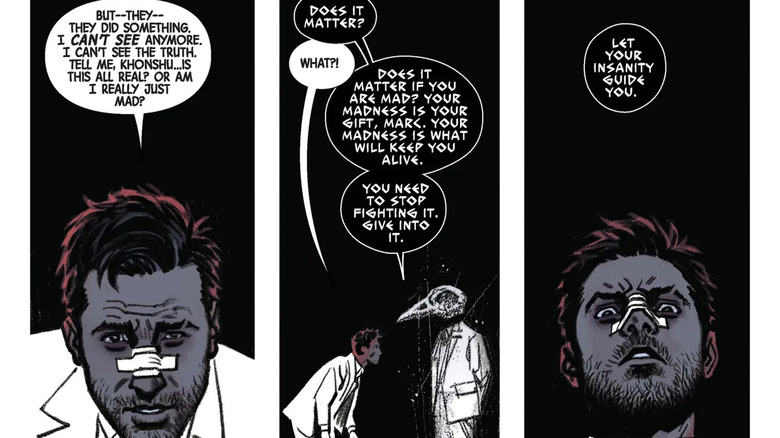Why Fans Of Mr. Robot Should Check Out Moon Knight
The premiere of "Moon Knight" just aired, introducing audiences to a dopey, confused British man named Steven Grant (Oscar Isaac) as he struggles with gaps in his memory that lead to a shocking revelation in his life. Isaac's portrayal of Steven is charming and sympathetic on the surface, but the audience is quickly clued in to the idea that Steven's troubles are way darker and more complicated than he seems to realize.
Not only is there another personality (maybe more) taking over whenever he's unconscious, but it doesn't seem like Steven's personality is the "main" one. After all, that British accent of his is intentionally a little silly and unconvincing, and it doesn't seem like a coincidence that his so-called mother never answers or responds to his calls. The premiere ends with Marc Spector — the version of himself that Steven sees in mirrors and speaks with an American accent — taking over and easily fighting the creatures attacking him. It leaves us wondering just how much of Steven's life was ever real to begin with.
If you were a fan of "Mr. Robot," the USA drama that ran from 2015 to 2019, this all might feel a little familiar to you. That show also featured a protagonist who gradually figured out he had dissociative identity disorder and struggled a lot with navigating this reality after realizing it. Although we've only seen one episode of Marvel's newest mini-series, there's a lot going on here that a "Mr. Robot" fan might find interesting.
The mental illness is treated with kindness
In recent years, characters with dissociative identity disorder (DID) have been consistently featured on film and TV, and it's not hard to understand why: it's an inherently interesting, very "cinematic" sort of condition. You can visualize what the character's going through in a way you simply can't with other types of disorders. The problem is that a lot of screenwriters and directors hear "multiple personalities" and they don't do much research beyond that, nor do they seem all that interested in exploring the person behind the condition. Often, characters with DID are portrayed as deranged villains, with movies like "Split" and "Pyscho" prioritizing high-stakes drama over a realistic or empathetic portrayal.
So far, however, "Moon Knight" follows the "Mr. Robot" path of prioritizing empathy for the character with DID over anything else. Although the mystical nature of the show means the contrast of his personalities are going to be far more extreme than a realistic case, the show roots us firmly in Steven's point of view throughout the premiere. We don't find out he's missed three days of his life until he does, and we miss all the fight scenes Steven himself doesn't get to see. Just like season 1 of "Mr. Robot," the premiere asks you to imagine what it would feel like to gradually realize that someone else has been interfering with your mind and body. It lets you learn about Steven's situation along with him.
Multiple personalities isn't the main point
One of the reasons "Mr. Robot" worked so well is that, for as much focus Elliot's DID received throughout the show, it was never the main thing "Mr. Robot" was concerned with. Elliot was primarily a hacker working to crash the world economy and take down the group of ultra-powerful people who were pulling the strings. His disorder was a part of him, but it was never his defining trait. It also isn't treated as something that excuses Elliot of all his less-admirable decisions. The show holds Elliot accountable for the things he does, while still having compassion and understanding for what he's going through.
"Moon Knight" takes the same cue, centering us around a character who is fundamentally kind and curious about the world around him. He's genuinely interested in the Egyptian artifacts in the museum he works at, and his long-running desire to be a tour guide there makes him sympathetic on his own, even if we didn't know anything else about him.
A lot of fiction centered around characters dealing with mental illness have a tendency to make it their only interesting quality, their only source of conflict, the only explanation for why they do the things they do. Both "Mr. Robot" and "Moon Knight" (so far, at least) manage to avoid that trap.
"Your madness is your gift, Marc."
Although Elliot and his main other personality, Mr. Robot, were at odds throughout most of the first three seasons, by season 4 they were comfortably working together as partners in crime, using their different sensibilities to handle situations better than either of them could pull off on their own. In the comics, Steven also manages to find a healthy balance with his other personalities, often switching between them with ease when dealing with a task that suits a specific one.
If "Moon Knight" chooses to follow along its main character's later trajectory in the comics, which certainly seems to be the case, then one theme we can expect it to explore is the idea that Steven is a good hero because of his condition, not in spite of it. Throughout the characters' run in the comics, he's varied from someone tortured by his condition, to someone who's learned to manage it, to somebody who has used it to the clear benefit of himself and those around him.
"Moon Knight" may be a very different show in a lot of ways. For one, it's a Disney+ product, so no one's expecting it to have any of the strongly anti-corporate commentary that "Mr. Robot" was famous for. And considering Steven's condition has a supernatural explanation, and how the show's obliged to fit neatly into the rest of the Marvel Cinematic Universe, it's likely "Moon Knight" won't cover much of the same thematic ground. But for those who were fascinated by Elliot Alderson's struggles with DID, this new show's got a lot to offer.



